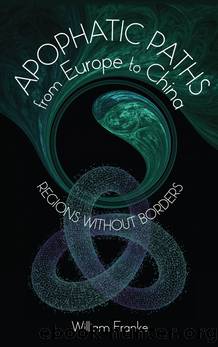Apophatic Paths From Europe to China by Franke William

Author:Franke, William
Language: eng
Format: epub
Publisher: State University of New York Press
Published: 2018-08-14T16:00:00+00:00
NEW DEBATES ON THE RELEVANCE OF TRANSCENDENCE TO CLASSICAL CHINESE THINKING
Smid finally and cogently attributes to Hall and Ames a methodological âblind spotâ concerning transcendence. By virtue of the fact that they define it as not significant to the Chinese conception of the world, or as ânot a defining priority,â they are not able to take account of it at all and indeed exclude it in principle on the basis of their conviction that it is misleading and erroneous. However, for other researchers there is evidence that transcendence is significantly present in Chinese conceptions of the real. Smid, in principle, is disposed to grant that if transcendence is only marginally significant in Chinese culture, then Hall and Ames could be relatively justified in excluding it for the sake of gaining clarity in their presentation of the features of Chinese culture that count most or are âdeterminingâ (123). I would suggest, instead, that this is not a matter of degrees of presence but of the recognition and recognizability of transcendence tout court. âTranscendenceâ is not showing up for Hall and Ames not because of its scarcity and marginality but, on the contrary, because it is so pervasively and overwhelmingly significant everywhere in Chinese thought. It is not manifest as any particular phenomenon, not even as a kind of reality or unreality or surreality that Hall and Amesâs ontological optics can register and perceive. Seen thus, the question of transcendence cannot be just a minor issue or one that can be marginalized: the whole basis of our approach to and understanding of the distinctive nature of Chinese thought hinges on it.
Not so surprisingly, then, there are numerous scholars today who are turning back to transcendence and zealously defending the centrality of a dimension of transcendence in Chinese philosophy. One such comparative philosopher is Eske Møllgaard.49 Møllgaardâs counterattack addresses itself also to Jullienâs denial of ontological difference in Chinaâthat is, of any categorically other, higher reality, noting that the Zhuangzi explicitly states that the Way is âbeyond the dichotomies of âfullâ (ying) and âemptyâ (xu), ârootâ (ben) and âbranchâ (wei), âto accumulateâ (ji) and âto disperseâ (san). The Way is thus beyond the continuum that, according to Jullien, constitutes the totality of the ancient Chinese philosophy of processâ (2). Møllgaard cites Chinese and Japanese scholars of Daoism who, unlike Western scholars, find that âin Laozi and Zhuangzi there are two distinct realms: the realm of âthingsâ (wu), which is under the constraint of time and space, and the realm of the âWayâ (dao), which transcends beings and forms in time and spaceâ (3). Recognition of this ontological difference leads to clearly apophatic formulations of the Daoist project: âTherefore, according to Zhuangzi, the highest attainment of the ancients was to realize that there is âa realm [or state] before there are thingsâ (weishi youwuzhe). The realm before there are things is the âWayâ (dao), which âthings thingsâ (wuwu) but is ânot a thingâ (feiwu) itself, and so, is strictly speaking ânothingâ (wu)â (3). Møllgaard
Download
This site does not store any files on its server. We only index and link to content provided by other sites. Please contact the content providers to delete copyright contents if any and email us, we'll remove relevant links or contents immediately.
| Anthropology | Archaeology |
| Philosophy | Politics & Government |
| Social Sciences | Sociology |
| Women's Studies |
The Secret History by Donna Tartt(18596)
The Social Justice Warrior Handbook by Lisa De Pasquale(12049)
Thirteen Reasons Why by Jay Asher(8664)
This Is How You Lose Her by Junot Diaz(6640)
Weapons of Math Destruction by Cathy O'Neil(6027)
Zero to One by Peter Thiel(5597)
Beartown by Fredrik Backman(5495)
The Myth of the Strong Leader by Archie Brown(5344)
The Fire Next Time by James Baldwin(5156)
How Democracies Die by Steven Levitsky & Daniel Ziblatt(5067)
Promise Me, Dad by Joe Biden(5012)
Stone's Rules by Roger Stone(4966)
100 Deadly Skills by Clint Emerson(4773)
A Higher Loyalty: Truth, Lies, and Leadership by James Comey(4743)
Rise and Kill First by Ronen Bergman(4627)
Secrecy World by Jake Bernstein(4548)
The David Icke Guide to the Global Conspiracy (and how to end it) by David Icke(4515)
The Farm by Tom Rob Smith(4384)
The Doomsday Machine by Daniel Ellsberg(4347)
